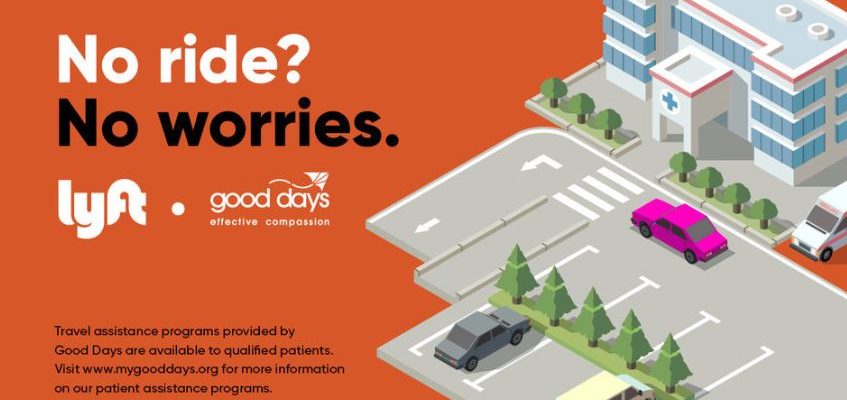FRISCO, Texas, Feb. 25, 2020 — Good Days today announced a new partnership with the ridesharing company Lyft to provide safe and reliable transportation services for eligible individuals and their caregivers so they can get to and from important medical appointments at no cost.
This initiative will enable Good Days’ Patient Care Navigators to request and coordinate nonemergency medical transportation for individuals who are enrolled in the national non-profit’s travel assistance programs. Lyft currently operates in 644 cities across the United States.
“Too many people in this country who have rare and chronic diseases are forced to miss important medical appointment because they don’t have a car or cannot afford to get there,” said Clorinda Walley, president of Good Days. “This is one more burden that we can eliminate so that people can focus on their health not the barriers to healthcare. We are proud to partner with Lyft to offer this innovative service.”
Riders don’t need the Lyft app or a smartphone to access free transportation through this partnership. Good Days’ Patient Care Navigators coordinate transportation needs and riders are updated via text message or phone call with trip details. Good Days handles all billing and payment so that scheduling rides is simple and convenient.
“People who miss a medical appointment or have to reschedule at the last minute frequently cite transportation as a factor,” said Randie Odebralski, chief operating officer of Good Days. “We are always looking for ways to alleviate common challenges that too often go unrecognized. By providing patients with door-to-door transportation, we’re expanding our services and most importantly providing the high-quality attention and care Good Days is known for.”
Health Outreach Partners found in its 2017 Rides to Wellness report that 25 percent of missed appointments are caused by transportation barriers. Additionally, the National Institutes of Health has previously said that about 3.6 million Americans miss at least one medical appointment or delay medical care each year due to a lack of reliable transportation.

